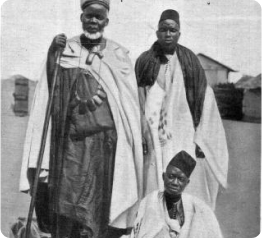Shaykh Ahmad al-Ayyashi Sukayrij
By Fakhruddin Owaisi and Zakariya Wright
Shaykh Ahmad al-Ayyashi Sukayrij (1878-1944) was born in Fes and educated in the Islamic sciences at the prestigious Qarawiyin University. He was a prolific author and a renowned scholar throughout North Africa. His expertise in Islamic law earned him appointments from the Moroccan government as supervisor of waqf (inalienable trusts) property in Fes (1914-1919), chief jurist (Qadi) of Wajda (1919-1924), Qadi of al-Jadida (1924-1929) and Qadi of Settat (1929-1944). On account of such broad scholarly expertise, the Egyptian Hadith scholar and Tijani Shaykh Muhammad al-Hafiz al-Misri, in the introduction of his work on al-Hajj Umar Futi, referred to Sukayrij as “the most knowledgeable person of our time.”
He was also a consummate gnostic who had studied under some of the more illustrious scholars of the Tijaniyya in the nineteenth century, such as Ahmad Abdalawi and Abdul-Karim Bannis, the latter who authored the central work on Tijani practice, Durrat al-Taj. He was known for his sobriety in Sufi practice, and it is said that he disapproved of excessive emotional displays during dhikr. In his defense of the Tijaniyya from its detractors, he emphasized the humility and orthodoxy of its leading scholars. In the book, al-Sirat al-Mustaqim, he was famous for asserting that the spiritual positions belonging to Shaykh Ahmad Tijani and his followers were a distinction from God, but not necessarily a mark of superiority.
The personal saintliness of Shaykh Sukayrij attained wide renown. Shaykh Hassan Cisse, who recently met with his descendants in Marrakech where he received the walking stick, fez and ring of Sukayrij, relates a story of the Shaykh being questioned about his activities as a Qadi (judge). Accused of accepting the judgeships for the government stipend, Shaykh Sukayrij lifted the pillow on which he was reclining and shook it in front of the questioner. Money started to fall from the pillow onto the floor, upon which the Shaykh simply said that it was God who provided his needs, he was only working for the sake of Islam.
Among those who took the Tariqa Tijaniyya from him was Mawlay ‘Abdul Hafiz the Sultan of Morocco (1908-1912), who was exiled to France upon the French occupation of Morocco. The Sultan had previously been an enemy of the Tijaniyya, and had cooperated with the Moroccan Salafiyya movement in its polemic against the Sufi orders. After his exile, Sultan
Abdul Hafiz came better acquainted with the Tariqa, and after taking the Tijani wird, became one of its chief advocates. He later wrote the book, al-Jami’a al-‘irfaniyya al-wafiya bi shurut wa jull fada’il ahl al-tariqa al-Tijaniyya (published in Tunis in 1930), relating the history of the Tijaniyya, explaining its practices and praising its distinguished scholars, especially his teacher Ahmad Sukayrij.
Shaykh Ahmad Sukayrij himself authored about 160 works on all aspects of Islamic Knowledge, among which are:
1. A 20,000 line, Nazm Version of al-Suyuti’s Khasa’is al-Kubra.
2. A 500 line, Nazm version of Qadi Iyad’s Shifa.
3. A commentary on the Burdah.
4. The renowned Kashf al-Hijab amman Talaqa ma`a al-Shaykh al-Tijani min al-Ashab (published in Fez, 1907), a giant encyclopedia of the disciples of Shaykh Ahmad Tijani.
5. The comprehensive book of Tijani doctrine, al-Kawkab al-Wahhaj li tawdih al-minhaj (published in Tunis, 1910), written as a commentary to Durrat al-Taj.
Shaykh Ahmad Sukayrij possessed more than 600 ijazas (diplomas) in various Islamic Sciences, which he transcribed in his seminal work, Qadam al-Rusukh fima li-Mu’allifihi min al-Shuyukh. In the same book, Sidi Sukayrij wrote: “The first one to whom I gave authorization in all these chains of transmission was the Khalifa al-Hajj Ibrahim Niyass.” He also said to him, “You are the ‘Alim (scholar) of Black Africa (al-Sudan).”
For his part, Shaykh Ibrahim Niasse addressed Shaykh Sukayrij in a letter dated 1352 (1932 C.E.), and reprinted in the Jawahir al-Rasa’il, as follows:
“Our greatest love, the esteemed shaykh, the most famous scholar, the full moon in efflorescent radiance, the proof of this [Tijani] path, and the assistance of this company, the one who has spread the knowledge of it [the Tijaniyya] by his accomplishment: the emblem of Divine gnosis, the owner of the spiritual medicine, the upright state and the eternal secret; the adept among adepts … Sidi Ahmad bin al-Hajj al-‘Ayyashi Sukayrij.”
Although Shaykh Ibrahim Niyass had numerous ijazahs in the Tijaniyya, he would always use that given to him by Shaykh Sukayrij during their meeting in Morocco in 1937 when initiating others into the tariqa. Indeed, the silsilah, or “golden chain,” passing through Sukayrij was the shortest to Shaykh Ahmad Tijani of any scholar in the twentieth century.
Before he passed away, Shaykh Sukayrij had a dream in which he was in the company of Qadi ‘Iyad ibn Musa. Then it so happened that he passed away while he was in Marrakech in 1944, and was indeed buried in the Mausoleum of Qadi ‘Iyad.




